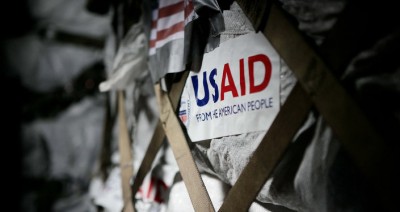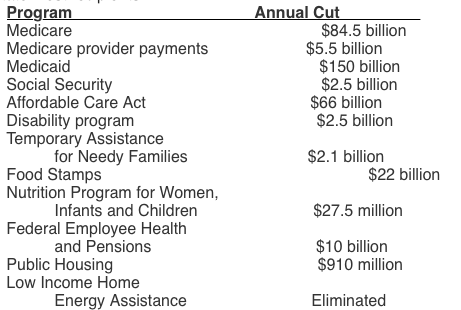Lessons from Ukraine: Shift Foreign Aid to U.S. Desperate Domestic Aid Programs

If anything, the Trump-Ukraine impeachment issue reveals to the American public that ever since 1961 when the Foreign Assistance Act was passed, perhaps nearly trillions of our tax dollars have been used by decades of administrations as a primary tool to dictate foreign policy to resource-rich, poverty-ridden countries. Or those considered geographically strategic. Humanitarian and developmental aid have always been a cynical cosmetic cover.
The real objective—imposed by the State Department’s USAID (U.S. Agency for International Development) program since 1961—has been to help U.S. corporations exploit and profit off those nations like European colonizers of old. A bonus is obtaining cheap labor, railroads, ports—and free protection by U.S. armed forces instead of paying for security as is done at home offices.
To ensure cooperative obedience from recipient countries for all this, as Consortium News’s Joe Lauria noted, it’s been “routine” to conduct such policy “with bribes, threats, and blackmail.”
USAID’s very name suggests an agency devoted solely to furnishing basic needs such as food, shelter, clothing, schools, and healthcare to dozens of needy nations.
So perhaps the current Ukrainian situation has shocked many Americans to learn that some $391 million ($115,000,000 in military aid) of their taxes for FY2019 were delayed to force that government to provide corruptive evidence against Trump presidential rival Joe Biden.
Others aren’t surprised, however, nor do they ever expect such Mafia-like extortion to end any time soon.
For instance, Congressional appropriations to DOS from the FY2020 budget rest on demands—major and minor— to several Balkan countries, Burma, Columbia, Egypt, El Salvador, Guatemala, Haiti, Honduras, Iraq, Libya, Mexico, Pakistan, Somalia, Syria, and Venezuela.
Following Trump’s budget recommendations, the Senate appropriations committee terminated funding to the United Nations Human Rights Council on grounds of bias against Israel and the UN Relief and Works Agency. UNRWA receives a third of survival funding for five million Palestinians, descendants of nearly a million refugees ousted from Israel’s founding in 1948.
When money is not withheld, billions have been siphoned off for years by recipient government officials to third parties, seemingly trimming distribution of goods and services to the needy. After all, the House and Senate appropriations committees deciding DOS allocations just cited routine corruption in nearly a dozen countries, bolstered by a lack of accounting transparency.
DOS also was scolded repeatedly by House members for tardiness in reporting to Congress about how that aid was spent.
But neither committee questioned how $10 million dollars to the World Meteorological Organization constituted humanitarian aid. Nor why their Senate counterpart could approve $360 million for the National Endowment for Democracy, much less $675,000 for the Commission for the Preservation of America’s Heritage Abroad. Or why both committees gave $4.5 million to the Commission on International Religious Freedom.
Moreover, for all the talk about fostering stable and peaceful governments with our tax dollars, why did both groups agree to give $45 million for the U.S Institute of Peace, yet allocate $2.1 billion to a dozen third-world countries for the Military (weaponry) Financing program ?
And $28.7 million to the overseas-based International Military Education and Training program—(shades of the infamous U.S. Army School of the Americas)?
Both also seemed to wink at the Pentagon’s hiding its appropriation of nearly $8 billion in the DOS budget to protect its OCO/GWOT forces (Overseas Contingency Operations/Global War on Terrorism) from cuts or sequesters. Indeed, because all three military programs are operating out of DOS, it only confirms that our armed forces have been free-hires for U.S. business interests since 1793 when Tripoli pirates preyed on commercial vessels. As future president John Adams then argued, businesses, not taxpayers, should cover their own security as they do even at branch offices. Or hire Blackwater. Eric Prince is looking for clients.
Now, in normal times few Americans would object to spending $9 billion on global healthcare —clean water and nutrition to malaria and HIV/AIDS—or $3.5 million for eye glasses. But today the U.S. is about to face significant hard times predicted to equal even the 1930s Great Depression.
A host of economic pundits are certain of that oncoming crash. Two-thirds of chief financial officers in a recent Duke University poll are expecting it as soon as late next year.
Obviously, foreign aid even now is a luxury American taxpayers can no longer afford. Rising domestic needs for food, shelter, clothing, schools and healthcare—coupled with rising unrest from nationwide strikes and other kinds of street militancy—over economic conditions suggest that the U.S. might well need aid from other countries.
This may not be a joke if nothing changes.
Consider that both the Trump Administration and Congress passed (Senate: 67-28 ; House: 284-149) an eye-popping $2.7 trillion FY2020-21 budget into law last August.
Spread over 10 years, even the annual cuts of some $301.3 billion shown below for major domestic programs will devastate most recipients:
Presidential candidate Bernie Sanders said it best even before the proposed bill was sent to Congress:
The Trump budget is breathtaking in its degree of cruelty and filled with broken promises…. This is a budget for the military industrial complex, for corporate CEOs, for Wall Street and for the billionaire class. …We don’t need billions of dollars for a wall that no one wants. We need a budget that works for all Americans, not just Donald Trump and his billionaire friends at Mar-A-Lago.
Keeping most voters in the dark about the upcoming drastic domestic cuts affecting them all before the 2020 election seems to have been the plan of both Trump and a majority in Congress.
Both pessimists and realists view such cuts as planned genocide, considering the just-released two-year study from the GAO (General Accountability Office). Its bottom line: Being poor and without lifelines like Social Security/Medicare for those over 65—and those other safety-net programs—guarantee an early death.
And as presidential candidate Sen. Elizabeth Warren has declared for years is that all it takes for today’s well-off millions to become poor tomorrow are job losses, or bankruptcies from medical bills, divorce, rent increases, or overextended borrowing either from banks or credit cards.
In other words, a national crash as bad as 2008 will make paupers out of most of the public and in desperate need of these services targeted for the axe. Homelessness, soup kitchens, and suicidal despair will be rampant.
And Trump’s idea for ending homelessness—past, present, and future—are internment camps even now being discussed by his aides and Los Angeles officials. He’s certainly aware that President Franklin Roosevelt set up the WWII Japanese interment camps by an Executive Order (EO). Given that 553,000 of the nation’s homeless last December probably have increased by thousands more, he’ll undoubtedly again demand the Pentagon use the armed forces for free labor to build those tented, electrified-fenced camps.
The first tangible sign of this grim scenario began in 2017 with the Trump administration’s tax cuts for the rich and corporations expected to be covered by these significant slashes to domestic funding.
Just recently it’s been his plan to stop free school lunches for 500,000 children whose families use food stamps. Then, following that list of cuts above, it was saving $4.5 billion in food stamps themselves over the next five years. That will increase starvation for 20 percent of already destitute families, seniors, and disabled out of the 40 million dependent on this program.
Several days ago, astonishingly amid cheers and applause at Florida’s The Villages retirement community (median age: 70.9; mean household income: $77,180)—Trump signed an EO to throw 20.4 million Medicare Advantage participants from federal coverage and back into the prohibitively expensive maw of private insurance companies.
In past, insurers implementing the program for the government have overcharged it annually by $10 billion. And when caught (like UnitedHealth), they refused to reimburse the Treasury.
Trump’s EO permits insurers not only will delay and deny coverage to thousands of the elderly poor, but rigorously enforce rules about preexisting conditions and charge high deductibles, copays, and ruinous annual increases of premiums.
It’s true that even if all genuine foreign-aid spending were lifted from the DOS’ allocation of nearly $56 billion, it would only partly replace that annual $301.3 billion for domestic programs. But at least it would be a trigger for humanitarian organizations and beneficiaries to start agitating for other federal sources. They are fully capable of goading action from Congressional budget hawks and GAO into extraordinary scrutiny of other federal departments and agencies to ferret out bloat and boondoggles and weigh whether they have greater priority over upcoming domestic needs.
However, all is not lost.
Three solutions to this staggering domestic shortfall are possible if an enraged public threatens to vote against Congressional incumbents in 2020 approving those inhumane budget cuts. Or to vote for those exercising Congressional powers to halt them.
One device is Congressional rescinding line-items after appropriation bills have become law. They’ve used this “rescission” tool for decades and numerous times (273 in 1995) and on large sums ($24.6 billion in 1992) either to cut or add amounts following “second-thoughts” about original allocations.
Another device is “reprogramming” allocations from one federal department to another. The Pentagon has repeatedly done it in moving its OCO/GWOT funds to the State Department. That long-time precedent means that Congress can move significant cuts in DOS’s foreign aid programs—and those from otherfederal departments and agencies—to fill the remaining domestic hole.
An additional solution was just offered by CounterPunch writer Chuck Collins. He strongly endorsed the surtax on the rich plans urged by Bernie Sanders and Elizabeth Warren:
As a nation, we will need to raise trillions to protect Social Security, Medicare and Medicaid, and to address urgent priorities such as health care, climate change, child care, higher education, opioid addiction, and more.
Tragic as it will be for foreign countries to be denied U.S. humanitarian aid after decades of receiving it, the coming economic dilemma means looking elsewhere for such help: non-profit agencies, philanthropists, private institutions, the United Nations, the European Union, and the like. In America from now on, charity finally must begin at home.
*
Note to readers: please click the share buttons above or below. Forward this article to your email lists. Crosspost on your blog site, internet forums. etc.
Barbara G. Ellis, Ph.D., is the principal of a Portland (OR) writing/pr firm. A veteran professional writer and editor (LIFE magazine, Beirut Daily Star, Mideast Magazine), Ellis also has been a long-time journalism professor (Oregon State University/Louisiana’s McNeese State University) and a nominee for the 2004 Pulitzer Prize in history (The Moving Appeal). She is a contributor to Truthout, Counterpunch, Dissident Voice, and Global Research, as well as being a long-time political and environmental activist—including canvassing for Medicare-for-All.


